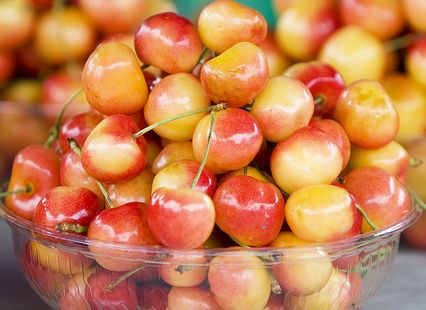Cherries, Cherries, Cherries
By L. Stolpman in Food on Jun 15, 2009 5:20PM

A bowl of Rainier Cherries.
There are two cherry ancestors - one sweet (Prunus avium) and one sour (Prunus cerasus). Every cherry you're eating today descended from one of these wild species. Sweet cherries, the kind you might eat out of the bag before getting home, include varieties like Bing, Royal Ann, Rainier, or Lambert. Sour cherries will make your mouth pucker and water and are best when cooked with sugar and put into a pie. Varieties include Early Richmond, Morello, or Montmorency.
When picking cherries, look for firm fruit that is not bruised or cut. Avoid bags that have cherry juice on them, indicating some crushed fruit. Get them home and put them in a plastic container (it does not have to seal) and into the fridge where they should stay for 4-6 days. Wash them just before eating.
Why the price tag on cherries? Cherries, in general, are very weather dependent and disease susceptible. They bruise easily and don't ripen after picking. Even with great weather, it is a fairly labor intensive process to get those cherries to your house in great condition. Rainier cherries are even more delicate. They bruise easily and are heat sensitive - this means picking them carefully and transporting them carefully. So why would someone pick Rainier cherries over any other? Because they are so, so, awesomely sweet.
Washington State University scientist Harold Fogle crossed Bing and Van cherries (both sweet varieties) and the resulting yellow and red fleshed fruit was named after Mount Rainier. If you find yourself sometimes throwing away half a bag of cherries you never made it around to eating, consider spending the extra money for a smaller amount of Rainier that you're darn near guaranteed to finish.
If you can't get enough cherries, head to the National Cherry Festival, held in Traverse City, Michigan from July 4 - 11 this year.
Picture by Digitonin.